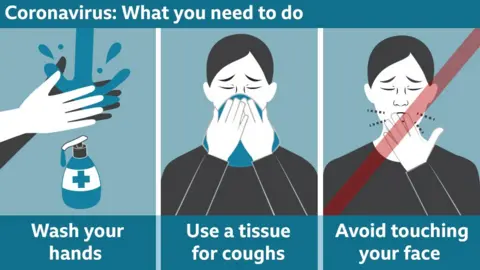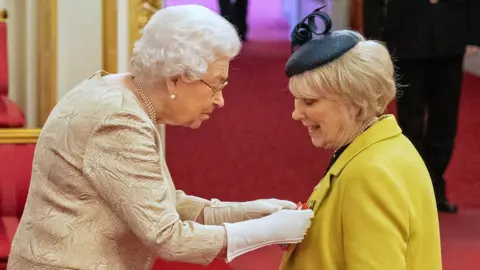Coronavirus: Hospital patients to be seen via video link
 BBC
BBCHospitals are being asked to carry out more video-based consultations of patients to reduce the risk of spreading the coronavirus.
NHS England hopes the move will reduce the number of people in hospitals and lower the potential for transmission.
Meanwhile, the government is launching a major public health campaign urging people to regularly wash their hands.
Officials believe up to a fifth of the workforce may be off sick during the peak of an epidemic in the UK.
The number of people diagnosed with coronavirus in Scotland has risen to three, bringing the total number of UK cases to 53.

What do I need to know about the coronavirus?
- HOW IS THE UK PLANNING FOR AN OUTBREAK: How prepared are we?
- WHAT ARE THE SYMPTOMS? A simple guide
- HOW TO SELF-ISOLATE: What you need to know
- WHERE ARE WE WITH A VACCINE? Progress so far
- A VISUAL GUIDE TO THE OUTBREAK: Virus maps and charts

England's chief medical officer Prof Chris Whitty told BBC Breakfast that up to 80% of the population could be infected with coronavirus, which causes Covid-19, "in the worst case scenario".
Asked whether Wuhan-style lockdown measures could be imposed in towns and cities across the UK, Prof Whitty said it would be "very unlikely".
He said it was "likely" but not definite the virus will become an epidemic in the UK.
"A wave is almost certainly coming, but we don't know the size," he said.
Hospital trusts and other health organisations have been sent a letter from NHS England outlining steps they should take to prepare for a possible surge in the number of patients.
They have been asked to carry out more video consultations from home and to consider ways to increase the availability of hospital beds and resources.
The government's "battle plan", announced on Tuesday, set out proposals to bring back retired doctors and nurses and to free up beds by cancelling non-urgent operations.
The new advice for hospitals coincides with the launch of an expanded information campaign promoting frequent hand-washing, for at least 20 seconds each time.
Government adverts across print, radio, online and billboards will urge people to wash their hands when they arrive at home or work, after they blow their nose, cough or sneeze, and before eating or handling food.
A hospital worker at the Cumberland Infirmary Carlisle in Cumbria has become one of the latest people in the UK to test positive for Covid-19.
Colin Cox, director of public health at Cumbria County Council, said the member of staff had self-isolated after a trip to northern Italy, and "did not come into work and has not had any contact with patients".
Another Carlisle resident has also tested positive, Mr Cox said.
In other developments across the UK:
- CCTV images have been released of four men wanted over an allegedly racist attack on London's Oxford Street. Jonathan Mok says he heard shouts of "coronavirus" before he was targeted
- Two GP practices in Torquay have closed until mid-March, after a pupil at a nearby grammar school tested positive for the virus
- Sony has closed its offices in London, Paris and Gdynia - in Poland - and told employees to work from home. The company says the move is "out of an abundance of caution"
- The government has bowed to pressure and changed its stance on insurance to cover businesses for coronavirus losses in England, after business owners said lost earnings from the virus risked not being covered under existing rules
- Labour's shadow health secretary Jonathan Ashworth has called on the government to provide emergency funding to support the NHS through the outbreak, while party leader Jeremy Corbyn warned the health service was already at 94% bed occupancy before the virus hit
- London Book Fair, which was due to begin on 10 March, has been cancelled hours after major publishers such as HarperCollins pulled out over coronavirus fears
- The Trades Union Congress (TUC) has urged the government to provide support for workers who do not qualify for statutory sick pay
Health Secretary Matt Hancock said washing hands regularly was the "single most important thing that an individual can do".
About 90,000 people have been infected globally since the outbreak of coronavirus in Hubei province, China, in December, with cases in more than 50 countries and more than 3,000 deaths.
Last week, a British man who was infected on the Diamond Princess cruise ship quarantined in Japan became the first UK citizen to die from the virus.
 PA Media
PA MediaThere are four stages to the government's response: containing the virus' spread, delaying it, mitigating its impact once it becomes established, and a research programme to improve diagnostics and treatment.
Prime Minister Boris Johnson has stressed that "we should be going about our business as usual."
He said schools should stay open "if possible" and follow advice from Public Health England.
The government's plans warn that while the vast majority of patients in the UK will have a mild to moderate illness, similar to seasonal flu, a minority will require hospital care and a small proportion could die.
There are no estimates given in the plans but they do warn of an increase in deaths, particularly among the elderly and those with existing health conditions.
Prof Whitty said it was likely "a few" older and more vulnerable people will die if they become infected - but stressed that flu kills 8,000 people in the UK in an average year.
Neil Ferguson, a professor of mathematical biology at Imperial College, London, said the government had "days rather than weeks" to start making decisions about rolling out elements of its plans.
He told BBC Radio 4's Today programme the time for action is "very soon" and the measures would be put in place in a "phased way" to reduce the peak burden on the NHS.
Developments outside the UK include:
- Italian Prime Minister Giuseppe Conte is set to announce more measures to combat the outbreak. Italy is the worst-hit European country with some 2,260 cases and 79 deaths so far - including more than 20 in the past 24 hours
- Argentina and Chile have reported their first cases of the coronavirus
- There are fears of global shortages of some common drugs after India limited the export of certain medicines due to the virus
- Grants and low-cost loans are part of a $12bn (£9.4bn) emergency aid package to help developing countries tackle the impact of the virus
- And Australians have been stockpiling toilet paper after the country's first death from coronavirus was reported
